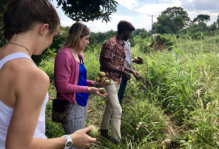Diving into the Deep End
By Sean Nguyen ’24
The Global Research Institute’s Summer Fellows Program provides international experiential learning opportunities to W&M students. This post is one installment of a series highlighting the 2023 Fellows’ key discoveries and formative experiences.
On my first day in Dar es Salaam, I was immediately thrown into the deep end. Weekly meetings prior to my departure for Tanzania — with the Global Research Institute’s Digital Inclusion and Governance Lab (DIGLab) and Innovations for Poverty Action — had shed light on the challenges hindering the widespread adoption of digital money. I had prepared for a summer of immersive direct research in the Summer Fellows Program, expecting to ease into the complex landscape of digital financing in East Africa. Through judicious exploration of articles and journals, I gained insights into Tanzania’s evolving embrace of digital transactions. Little did I know that within 18 hours of my arrival, I would find myself in a conference room with Vodacom employees, engaging in intense discussions about P2M, P2P, and G2P transactions, and the challenges of KAEs to incentivize consumers to stay within the digital ecosystem rather than resort to cashing-out.* If this sounds confusing to you, rest assured that it was equally disorienting to me on my first day. At that moment, it became abundantly clear that I had ventured far beyond my comfort zone.
Fortunately, my subsequent two months in Dar es Salaam evolved into an invaluable experiential learning opportunity. Tanzania has made significant strides in financial inclusion, with the number of financially excluded adults decreasing from 7.8 million in 2017 to 6.4 million in 2023, largely due to the rise of mobile banking. Among the notable financial services is Vodacom’s M-PESA, which has granted millions of Tanzanians access to financial services. During my first week, I had the privilege of interviewing various stakeholders within Vodacom. For instance, merchants at the Mwenge Woodcarvers Market shared their decision to the service which enabled them to secure loans that strengthened the budding stages of their business. Interviews with Vodacom’s KAE agents and their supervisors illuminated the challenges of teaching informal merchants how to utilize Lipa Namba. And casual conversations with local customers revealed a prevailing mistrust in traditional banking institutions and underscored the interdependence between merchants and consumers that hindered marketplace functionality.

Sean, Vodacom supervisors, KAEs, and IPA researchers unite post-field interviews.
One noteworthy finding emerged: despite the growing awareness of mobile money services, many Tanzanians primarily use their mobile money to cash out rather than for direct payments. For example, many Tanzanians preferred withdrawing mobile money, incurring a fee, when paying for groceries with cash rather than directly using M-PESA, Vodacom’s mobile money transfer service. This choice, despite its added cost and inconvenience, highlights a notable hesitation toward minor transactions via M-PESA. This paradox fueled my commitment to crafting payment method questions and a research guide, which will play a vital role in collecting qualitative data during ongoing focus group discussions across eight regions in Tanzania. Although bureaucratic challenges prevented me from witnessing firsthand the focus group discussions, I am eager to collaborate with ARC and DIGLab Director Phil Roessler this academic year. Together, we will delve into the qualitative transcripts to unearth crucial patterns in the barriers thwarting digital finance adoption, informing the strategic implementation of Locally-Targeted Coordinating Referral Incentives. This strategy aims to tackle the coordination challenge in both merchant and consumer mobile money adoption, leveraging cross-sided referrals to stimulate concurrent uptake from both market ends.
Venturing outside of my research, I made a deliberate choice to plunge into the deep end of Tanzanian life. With an insatiable curiosity, I sought out a global perspective at every turn. What unfolded before me was a remarkable display of Tanzanian hospitality, as locals and expats invited me to explore their unique culture.

During my first weekend, I found myself strolling through the Botanical Gardens alongside Amaka Kibete, a kind-hearted man who offered to give me a tour. Despite suffering personal hardships, including the loss of his parents at a young age and having to teach himself English, he had matured into a knowledgeable guide. While I was captivated by his insights into the lush greenery and his aspirations as a rapper, I was equally fascinated by his enthusiasm for American culture, including electric cars and Hollywood actors. We may not have exchanged contact details, but we parted ways with a mutual understanding that our paths would cross again, whether that be in Tanzania or the U.S.

Interestingly, my earliest friendship in Tanzania began in an elevator. Malcolm, a twenty-year-old incoming college student from Arusha, struck up a conversation with me as we descended two floors. This chance encounter led me to his office, where I was introduced to his colleagues and compassionate demeanor. Together, we created a bucket list of objectives to accomplish during my time in Tanzania. Although we couldn’t cross off everything on the list, I am determined to return to Tanzania and complete the remaining action items with him by my side.
Throughout my journey, I encountered countless hospitable individuals who left an indelible impression. On the basketball court, where my drive-ins amazed spectators in pick-up games (or as I like to think), trash-talking ignited unexpected friendships. These newfound friends would take me to local food stalls that remained well hidden from tourists, introducing me to culinary delights like Chips Mayai and Urojo. At the gym, I became a regular patron, exchanging fist-bumps with fellow fitness enthusiasts after challenging sets, despite being the only foreigner in sight. An artist named Mnamba invited me to his studio at the Nafasi Art Space, where he proudly displayed his canvases, eagerly seeking my opinion on how to title each piece. Even the security guard at my apartment building became a familiar face, and though our communication was limited by my basic Swahili skills, our daily greetings and thumbs-ups fostered an unexpected camaraderie. My apartment mates, hailing from Nigeria, Kenya, the United Kingdom, South Africa, and beyond, became a diverse family, sharing life experiences over home-cooked meals. And trips to Zanzibar, the Serengeti, and the Ngorongoro Crater served as poignant reminders that the power of locals’ kindness knows no bounds. I witnessed firsthand the smallest acts of support, like guiding lost wanderers, sharing lesser-known destinations, and fostering meaningful cross-cultural exchanges as I explained my dual Vietnamese-American identity.

In the heart of the Serengeti, Sean intently observes a herd of elephants through his binoculars.
These connections, woven with my professional development, added to the richness of my eight weeks abroad. My time in Tanzania has filled me with deep gratitude for the people, the culture, and the unforgettable moments of this country. I am indebted to the Global Research Institute, Professor Roessler, and Innovations for Poverty Action for offering financial and research support throughout each stage of my summer fellowship. Delving into Tanzania’s financial pulse, my research captured the nuanced perspectives on mobile money adoption via qualitative interviews. Armed with this in-depth understanding, policymakers stand poised to formulate strategic interventions toward a more progressive financial framework in Tanzania. Diving headfirst into the deep end, regardless of choice or obligation, has gifted me with extraordinary experiences that will forever reside in my heart.
*For clarity: P2M (Peer-to-Merchant) refers to individuals paying businesses for goods or services; P2P (Person-to-Person) is direct money transfers between people, increasingly more via mobile applications; G2P (Government-to-Person) involves governments transacting to individuals frequently in the form of social benefits; and KAEs are professionals who train and onboard merchants to effectively utilize mobile money. If I had been versed in these terms, perhaps that initial meeting would have felt less like a surprise pop quiz.




No comments.